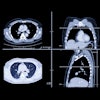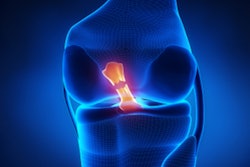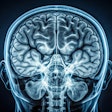
Artificial intelligence (AI) algorithms are demonstrating utility in a number of important musculoskeletal (MSK) imaging applications, according to a hot topic session held Tuesday at RSNA 2021 in Chicago.
For example, AI can help to speed up MRI exams. Researchers at NYU Langone Health, however, have developed a deep learning-based method involving undersampling that has been shown to accelerate knee MRI and shoulder MRI exams by a factor of four without negatively impacting image quality. A multisite, multivendor trial is currently underway to assess the generalizability of the technique on different types of scanners, said Dr. Michael Recht of NYU Langone.
"AI and deep learning appears to be a very promising technique to finally break the equation that we've been struggling with for the past 20 or 30 years, and that is to allow us to go faster in MR imaging," he said. "Right not we can do it in four or five minutes, but the hope is that with even more techniques, we can get it down to maybe two minutes or even less for an entire knee examination, making [MRI] perhaps much more available to patients and maybe even replacing plain films as the imaging modality of choice for certain types of musculoskeletal imaging."
Sarcopenia assessment
Leveraging the use of AI for tissue segmentation can also promote better use of imaging examinations. For example, algorithms can automatically assess sarcopenia on chest CT exams and predict all-cause mortality over a six-year period, according to Dr. Leon Lenchik of Wake Forest School of Medicine.
Translating these AI techniques from the research realm to clinical practice can be facilitated by focusing on the healthcare return on investment, Lenchik said. Currently, a patient's imaging study gets sent to the PACS after the scan is completed, resulting in a mostly text-based report produced by the radiologists.
"[Instead], we can intervene either at the scanner stage or the PACS stage or at a later stage and segment the tissues automatically and create some numerical information that can then be used as prognosis," Lenchik said. "So in the bone realm it could be used to prognosticate, for example, fracture risk, or in sarcopenia to potentially prognosticate frailty. But there's [also] many other applications."
Disease detection
There have been a small number of published research studies in AI-based MRI disease detection in musculoskeletal radiology applications -- mostly in the knee -- but to date, no such algorithms have received U.S. Food and Drug Administration (FDA) clearance or the CE Mark in Europe, according to Dr. Benjamin Fritz of the University of Zürich in Switzerland
AI-based detection of anterior cruciate ligament tears has produced results that are comparable to radiologist performance reported in a meta-analysis, but algorithms haven't performed quite as well for detecting meniscus tears, Fritz said.
"So there's still a lot of work to do," Fritz said.
Meanwhile, studies have shown that deep learning-based approaches can yield the highest performance in the literature for segmenting articular cartilage in the knee on MRI, according to Dr. Richard Kijowski of NYU Langone Health.
In comparison with other automated methods, deep-learning techniques were also found to provide more time-efficient segmentation of the articular cartilage of the entire knee joint on all MRI knee slices -- with minimal computational resources, Kijowski said.
AI for osteoarthritis
Multiple studies have also detailed the use of deep-learning algorithms to detect the presence and grade severity of osteoarthritis in the knee and hip. Although all of the top-performing models yielded promising areas under the curve, sensitivity, and specificity, their performance was by no means high enough to incorporate these algorithms currently into clinical practice, arthritis research studies, or clinical drug trials, Kijowski said.
"Thus, additional future studies are needed to improve model performance in osteoarthritis risk assessment," Kijowski said.
Practical tips
If you've decided to implement AI, there are a number of important considerations, said Dr. Hillary Garner of the Mayo Clinic Florida.
"Implementing AI relies on many different factors, but probably most heavily on the data and the people engaged in the process, as well as the development and continual improvement of infrastructure and strategy," Garner said. "But after implementation, there is also a need to regularly re-evaluate and optimize these factors to ensure or allow that AI solution to continuously learn and evolve with the natural changes in your local patient environment."
In addition to a number of open-access algorithms, there are currently 11 AI algorithms for MSK applications that have received FDA clearance, she said. And several more are currently in the review process.
It's important that these models undergo rigorous evaluation prior to purchase, she said.
"And the MSK radiologist really needs to be integral in that decision-making process," Garner said. "But if you're at a smaller practice with limited resources, the ACR's AI-Lab [service] could be helpful for you."




















